Peer Tutoring – TEST Site
Posted on Friday, April 30th, 2021
Peer Tutoring - I'd like to sign-up!
- Posted in
- Uncategorized
Posted on Friday, April 30th, 2021
Posted on Tuesday, April 6th, 2021
Another deadline is fast approaching for Algonquin College applicants. On May 1st applicants will need to decide if they will choose to accept their offer of admission for the Fall term which begins in September.
So why wouldn’t an applicant move forward with their plans to attend college? There’s a lot to unpack when answering that question, so let’s turn it around and focus on why most applicants do follow through on one of the most important decisions of their life. The primary answer is because they want a career and attending post-secondary education is the first step in earning a credential that opens doors.

Those doors are expected to open widely in many sectors as the world emerges from a prolonged shutdown caused by the COVID-19 pandemic. Take the hospitality and tourism industries, two sectors that have been particularly hard hit because of the forced closure of restaurants, ski hills and other tourism attractions for extended periods of time.
But there is a light at the end of the tunnel. As a mass vaccination program rolls across the country, albeit not soon enough for most Canadians, there are predictions from several economists of a robust economic recovery in many sectors. Canadians have been saving money and with borders closed and many of their favourite destinations off limits, that pent up energy and spending power bodes well for the economy.
A student enrolling in the Outdoor Adventure program this fall will graduate in the spring of 2023. Hopefully by that time, adventure tourism will again be thriving and the demand for graduates of the program will have returned to pre-pandemic levels. The Ontario government is banking on it, already announcing millions of dollars in investments to keep small businesses and tourism outlets operating until people are free to move around again.

Enrolments for post-secondary training have remained strong through the pandemic. College students have not put their plans on hold. They have adapted well to the change in the way their courses have been delivered, whether that has meant virtual classrooms and labs, or in person activities where physical distancing can be achieved and mask wearing is required, unless you’re hanging out in a tree. That’s been the case for Urban Forestry-Arboriculture students who have honed their skills as tree climbers with regular field trips, despite the pandemic.
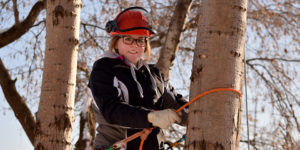
In some programs, students have experienced being on the front line of the pandemic. Nursing and Personal Support Worker students have been in high demand and have voluntarily supported the most vulnerable patients in long-term care centres, while also assisting with vaccination clinics. With an aging population and the pandemic exposing the strain that the health care sector has been under, health care jobs will continue to be plentiful.

So while some students will opt not to confirm their offer of admission, most will follow through with their original intentions when they applied to college. It will be a wise choice, because the need for highly skilled workers has become even more important as we adjust to whatever changes are in store for us in a post-pandemic world.
(Posted by Jamie Bramburger, Manager of Community and Student Affairs)
Posted on Thursday, April 1st, 2021
Making a career change is never an easy decision. Josh Sleep knew he needed to explore an educational plan that would give him the best option to secure an in-demand full-time career, not just another job. He found what he was looking for with our Computer Systems Technician (CST) program.
Sleep’s initial interest in the program grew through conversations with graduates from the program within the community. “They all mentioned the co-op opportunities and excellent job placement rates after graduation. As a mature student, this greatly appealed to me, as well as the shorter program length of 16 months. This is what originally sold me on the program, but there were many other benefits that I only learned about after enrolling. First off, the size of the Pembroke Campus is much smaller than a larger campus. In some ways, this may be seen as a negative thing, but I saw it as positive. The smaller size of the program in Pembroke means a smaller class size. It was nice to not only know the names of every one of my classmates but it also helped develop a rapport with them, as we knew we were all in this together. The small class size also allowed the teachers to develop personal connections with each student. They did not have three other sets of classes to think about; they were only concerned with the 25 people in our class.”
Sleep also quickly learned that because of the small program size, everyone had their own dedicated equipment to work within the lab. “We were each assigned a workstation with a normal computer and a server which is considered a super-powerful computer. This equipment sat at our desk, and we were the only ones allowed to use it. This encouraged a real sense of ownership with the assignments we were working on.”
“While many of the classes in the CST program focus on building technical knowledge, there are also some classes specifically concerned with job acquisition skills. The program covers all the bases from resume/portfolio building to job interview preparation, to what to look for in prospective employers. Even as a mature student who has had many jobs in the past, there was quite a lot of helpful information provided during the program. At the end of the courses, each student had created a portfolio for themselves. These portfolios contained several documents designed to get us thinking critically about our prospective careers. We wrote resumes, reviewed them with classmates, and rewrote them until they were the best that they could be. We did skill and personality assessments to help us discover ways of leveraging our best skills and traits in future interviews, or which sector of the IT job market would be a good fit. We even completed mock interviews with faculty members who were not our teachers. This was all extremely beneficial as these learning exercises were preparing us for the co-op application and interview process” shares Sleep.
It didn’t immediately occur to Sleep that there was an added benefit to his professors and the role that they played in his career preparation. “It really clicked closer to graduation that most of our instructors were also professionals currently working in the industry. This gave me a lot of confidence that the skills we developed in the CST program were practical, up to date, and in-demand within the job market. As supervisors and company owners, our professors were able to make sure we had the skills that they looked for when hiring for their own businesses.”
Sleep’s co-op preparation paid off when he secured a desk-side support role with the Canada Revenue Agency (CRA) during his paid summer co-op semester. The first day of a new job is nerve-wracking for anyone but Sleep learned very quickly that his team was there to support him. “The team I joined was very welcoming and helpful. They showed me the ropes and introduced me to the systems we would use to complete the required work. Everyone was very friendly, and let me know that they were there to support me with anything I needed.”
Sleep was placed on a team to support client offices that weren’t necessarily CRA operations. His team would support buildings from the Cornwall, Ontario border crossing to the international airport in Iqaluit, Nunavut. This gave him a really unique look at how other government agencies work to protect our country, and made Sleep proud to be able to contribute to the effort. This was also a great way to see the extremely varied positions available within the Canada Revenue Agency.
Sleep not only had the support of his CRA team members, but he also had the continued support of the College. “The co-op support officer from the Pembroke Campus worked hard to ensure that all of the co-op students were enjoying their experience. She would check-in and make sure I was comfortable with the work, and meet with my team lead to ensure I was adequately representing the school. It was a really motivating feeling to know that she could address any concerns that may have come up,” during his co-op experience.
“As a mature student, my career goal going into the CST program was simple: Get one. The program definitely helped a lot with that. Through the co-op and the training provided in the program, I am now at a place where not only do I have a career, but one where I have room to grow in any direction I choose.” By having the opportunity to explore and discuss exactly what he wanted out of his IT career during the program, Sleep felt confident transitioning into his employment. “The instructors exposed us to many different aspects of the IT industry and allowed us to see all the places we could go. The co-op aspect of the program was an excellent foot-in-the-door, and the in-demand skills that we were taught have helped me reach a point where I am able to think about career goals.”
It’s true that sometimes as a student you consider if what you are learning in class is applicable in the “real-world” but it was obvious to Sleep that the skills he acquired would come in handy in his day-to-day work at the Information Technology Branch (ITB) of CRA. “The hardware-specific classes in the first semester were invaluable for my desk-side support position. While it is true that most IT work today is simply replacing parts rather than repairing them, those classes gave me the troubleshooting skills to narrow down which part is causing the problem. Being able to replace a defective part of a computer rather than the computer itself is not only financially responsible but also ecologically responsible. These are two aspects that are very important to the CRA. The network services class gave me some skills I use every day in my current position including directory management and basic networking theory, but it’s the Linux class that has proven to be the most useful as this is something I did not have much exposure to outside of the program, and now it is most of what I do for work.”
When the COVID-19 pandemic hit, the lives of most Canadians were turned upside down. Similar to most, Sleep started to work from home. His team continued to work to ensure Canadians could access important applications including the Canada Emergency Response Benefit (CERB). “The team I work with maintains the integrity of many government services offered online. Specifically, we ensure communication between the various services and that the application process goes smoothly. We ensure that the applications such as My Account, My Business Account, and CERB have the ability to talk to our backend data stores. This allows the application to confirm your identity and passes you through to the appropriate service within the government network.”
Similar to the CST graduates that Sleep spoke to while considering taking the program, he likes to share two pieces of advice that have stuck with him. Both were offered by his professors who passed them along at the beginning of the first semester. They said “This industry requires you to be learning constantly. Even after graduation, you need a continued interest in technology in general or the specialization that you are looking to work into progress in your career. It is an old joke that as soon as you buy a new computer, it is out of date. That same premise applies to IT knowledge. New developments in both hardware and software occur every day. If you are not always adding to your knowledge and skills, you will be quickly left behind. The instructors really encouraged us to follow this advice by allowing each student to pick the topic for various projects. The second piece of advice was about the importance of soft skills. The IT industry has a stereotypical character of the lone hacker in a basement. People with lots of technical skills, but no social skills. Sometimes technical skill is all you need, but for the vast majority of IT jobs, you will need to work on a team, and for a client. Taking care to interact with people in a friendly, professional, and productive manner could mean the difference between getting a managerial role or staying at an entry-level position.”
The Information Technology Branch of CRA is looking to hire 500 students this year, making now the perfect time to apply to the Computer Systems Technician program and become the ideal candidate for a client service role with ITB/CRA (Source: HR Services, Information Technology Branch, Canada Revenue Agency).
-Josh Sleep, 2017 Computer Systems Technician Graduate
Posted on Tuesday, March 9th, 2021
Want to add to your resume and enhance your post-secondary experience? We are looking for student mentors for our incoming 2021-2022 first-year students aka JEDI Mentors!
Job Description
A JEDI is a second-year student who takes a leadership role in supporting first-year student’s college success. JEDIs are select individuals with ability and desire to:
Required Qualifications
We are looking for JEDI Mentors in the following programs:
If you have any questions, please contact:
Shelly Sutherland, Student Success Specialist
suthers@algonquincollege.com
OR your Program Coordinator
CLOSING OPPORTUNITY: FRIDAY, APRIL 2, 2021
Posted on Wednesday, March 3rd, 2021
Please find below information regarding two awards being offered. The deadline for application submission is April 2, 2021. Applications are attached. Completed applications should be emailed to moreaus@algonquincollege.com.
Terms
This cash award will be presented to a graduate at the annual Graduation Exercises.
The award will be based on the following two criteria. These two criteria will receive equal weight in the selection process.
Any student may apply who will graduate from a program of studies (of at least twenty-nine weeks) by the date of the annual Post-Secondary graduation.

Terms
This cash award is granted to a student graduating from a program of twenty-nine weeks or longer delivered at Algonquin College in the Ottawa Valley.
The award will be granted to a graduate who exemplified the greatest concern for the Algonquin College community while at the College.
Any student may apply who will graduate from a program of studies (of at least twenty-nine weeks) by the date of the annual Post-Secondary graduation.

Posted on Saturday, February 27th, 2021
Five years ago, Algonquin College made history when it appointed an Executive Director of Truth, Reconciliation and Indigenization. The position that Ron McLester accepted was the first such role in Canada’s post-secondary system. Since then it has evolved into a Vice-President’s role as the College embraces the calls to action that were made in Justice Murray Sinclair’s ground-breaking Truth and Reconciliation report in 2015.
The report was a watershed moment for Canadians. It shone a light on the injustices done to the Indigenous peoples of Canada, including the use of residential schools, which many have termed cultural genocide. Since the report was released, many businesses and organizations have responded positively and are making an effort to integrate Indigenous teachings into their day-to-day operations, including post-secondary schools.
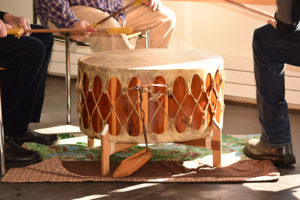 At Algonquin College’s Pembroke Campus, a short drive from the Algonquins of Pikwakanagan First Nation, several initiatives are underway. These include the introduction of a Kampus Kokum and Elder-in-Residence to support Indigenous students studying at the campus.
At Algonquin College’s Pembroke Campus, a short drive from the Algonquins of Pikwakanagan First Nation, several initiatives are underway. These include the introduction of a Kampus Kokum and Elder-in-Residence to support Indigenous students studying at the campus.
A Kokum is an Algonquin Anishinabe word for Grandmother and Annie Parker of The Circle of Turtle Lodge fits the role well. Her gentle and welcoming personality has been well received by students and staff as she provides cultural and traditional insight, support and guidance to Indigenous students.
The addition of a Kampus Kokum and Elder-in-Residence, Aimee Bailey, also of The Circle of Turtle Lodge, was made possible through a special project known as Mamiwi Maadaadizi, or “Start of an Algonquin Journey.” Mamiwi Maadaadizi is supported in part by funding from the Social Sciences and Humanities Research Council through the College and Community Social Innovation Fund grant. The project has several tentacles that reach into many areas of the campus.
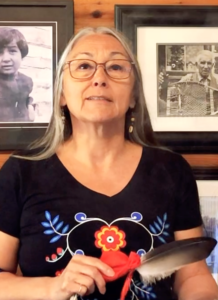 For example, several employees and students have participated in Talking Circles and presentations to better understand Indigenous history and philosophy that predate the formation of Canada. These activities have included the Kairos Blanket Exercise, which visually explains how Indigenous peoples lost their land rights because of settler encroachment.
For example, several employees and students have participated in Talking Circles and presentations to better understand Indigenous history and philosophy that predate the formation of Canada. These activities have included the Kairos Blanket Exercise, which visually explains how Indigenous peoples lost their land rights because of settler encroachment.
The trauma caused by the forced separation of children during what became known as the Sixties Scoop, when thousands of Indigenous children were placed in foster care or adoption services, and the impact of residential schools, has also been explored. More recently, employees have had the opportunity to learn about Medicine Wheels, the moon’s cycle from an Indigenous perspective and a private screening of the documentary “Colonization Road”, a provocative film that explores the impact of colonization on Canada.
Colonization Road, directed by Michelle St. John and narrated by comedian and activist Ryan McMahon, is a discovery of how the building of roads by European and American settlers negatively affected Indigenous communities, often leaving them isolated. The title for the film is a metaphor for what followed, the dismantling of their land and culture, the effect of which is still being felt decades later.
Sharing these stories are powerful teaching moments. The Algonquins of Pikwakanagan have an informative mobile display that is loaned to schools throughout the Ottawa Valley, including the Pembroke Campus, where it has been showcased for several years. The wooden display panels catalogue local and national Indigenous history, including the oppressive Indian Act of 1876, residential schools, voting rights and the founding of Indian Reserve Number 39, what is now the Algonquins of Pikwakanagan First Nation.
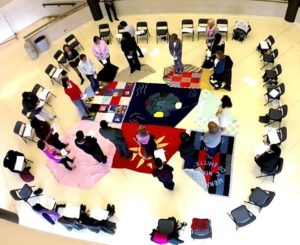 There is still much work to do but the Indigenization journey has begun at Algonquin College’s Pembroke Campus, a post-secondary school that stands on the shores of the Kitchissippi River (Ottawa River) on unceded traditional Algonquin territory. The river holds so much history and a few years ago it was recognized for its cultural value as it was designated as one of our country’s heritage rivers. A special plaque, written in the Algonquin language, acknowledges what the Algonquins call, “The Great River.”
There is still much work to do but the Indigenization journey has begun at Algonquin College’s Pembroke Campus, a post-secondary school that stands on the shores of the Kitchissippi River (Ottawa River) on unceded traditional Algonquin territory. The river holds so much history and a few years ago it was recognized for its cultural value as it was designated as one of our country’s heritage rivers. A special plaque, written in the Algonquin language, acknowledges what the Algonquins call, “The Great River.”
The river is the perfect backdrop for Indigenous teachings, but during the COVID-19 pandemic, very few students are on campus. Most are studying remotely. The Indigenous Drums that are frequently used for special ceremonies in the Campus Commons are quiet, but when the day comes that students can return to the campus, the drums will be awakened as Algonquin College’s Indigenization journey continues.
Jamie Bramburger is the Manager of Community and Student Affairs at Algonquin College’s Pembroke Waterfront Campus
Posted on Tuesday, February 16th, 2021
Now is the time to embrace winter! Our Winterfest celebration is an opportunity to make a conscious effort to explore the Ottawa Valley. The Ottawa Valley is Ontario’s adventure playground, a year-round adventure destination but winter turns it into a fairy-tale destination that no one wants to miss. As the snow blankets the region, adventurers and nature lovers in the Ottawa valley head outside to indulge in various adventure activities as the magic unfolds. Here are some of the experiences you can do to quench your thirst for adventure this winter season.

Gliding on the Snow Carpet: The serene environment ranging from tree-lined slopes, challenging vertical drops to gentle runs make it an ideal alpine skiing and snowboarding destination. Many true snow bunnies dream all year long with huge anticipation to glide through untouched powder on the slopes.
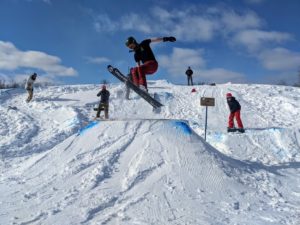 The options include Mount Pakenham, Calabogie Peak Resort, Mount Martin, Mount Molson etc. Mount Pakenham, located in Mississippi Mills, is Eastern Ontario’s premier family ski, snowboard and tubing location which is ideal for every enthusiast. At a height of 730 ft with a 280 ft vertical drop, this mountain offers 10 trails, plus glade trails, and 7 lifts to get you moving.
The options include Mount Pakenham, Calabogie Peak Resort, Mount Martin, Mount Molson etc. Mount Pakenham, located in Mississippi Mills, is Eastern Ontario’s premier family ski, snowboard and tubing location which is ideal for every enthusiast. At a height of 730 ft with a 280 ft vertical drop, this mountain offers 10 trails, plus glade trails, and 7 lifts to get you moving.
Calabogie Peaks, the tallest public ski resort in Ontario, is an all-seasons resort located at the base of Dickson Mountain on the shores of Calabogie Lake. Apart from skiing and snowboarding, one can also stay and enjoy the best of what winter offers with many snowy adventures.
The Mount Martin Ski Club (MMSC) maintains 12 runs including a glade run and 2 terrain parks (with jumps, rails and boxes), and is served by a T-bar, right in the Town of Deep River. Most trails are groomed, and all runs are patrolled by volunteers from the Canadian Ski Patrol.
Located in the heart of Petawawa, the Petawawa Ski Club operates on the world’s smallest ski hill, known by the locals as Mount Molson which offers lessons for skiing and snowboarding.
 Skiing Cross Country Trails: The Valley presents an outstanding array of Nordic trails for winter sport enthusiasts. Here there are a variety of excellent and scenic cross-country trails winding through meadows and forests for various skill levels such as Silver Spoon Trails, Madawaska Nordic Trails, Opeongo Hills Nordic and Forest Lea Trails – with 1.5 km of lighted ski trails for night skiing.
Skiing Cross Country Trails: The Valley presents an outstanding array of Nordic trails for winter sport enthusiasts. Here there are a variety of excellent and scenic cross-country trails winding through meadows and forests for various skill levels such as Silver Spoon Trails, Madawaska Nordic Trails, Opeongo Hills Nordic and Forest Lea Trails – with 1.5 km of lighted ski trails for night skiing.
Snowshoeing the Beautiful Backcountry: There isn’t any other better way to learn and be a part of our wonderful Canadian winters than simply getting out there and experiencing it first-hand. The Ottawa Valley is home to some terrific and pristine wilderness just waiting to be explored. All you need is a pair of snowshoes and you can explore hundreds of kilometres of amazing trails and wilderness routes. Moreover, there are numerous naturalist and interpretive trails such as Shaw Woods Outdoor Education Center, Kiwanis Walk Way and Petawawa Millennium Trail where you could learn more about the rich history and heritage of the place.
All you need is a pair of snowshoes and you can explore hundreds of kilometres of amazing trails and wilderness routes. Moreover, there are numerous naturalist and interpretive trails such as Shaw Woods Outdoor Education Center, Kiwanis Walk Way and Petawawa Millennium Trail where you could learn more about the rich history and heritage of the place.
 Ice Fishing – Winter Pastime for Everyone: Cradled between the Ottawa River and Algonquin Park, the Ottawa Valley is home to over 900 lakes and 4 major river systems. There are ample opportunities for anglers to get out on the frozen lake or river to net a trophy fish. The Valley boasts 158,000 acres of water filled with more than 20 species of fish such as bass, walleye, northern pike, muskellunge etc. Premier destinations include the heritage Ottawa River, Lake Dore, Golden Lake etc. Be sure to check out the Laurentian Valley Ice Fishing Derby on February 27 – learn more.
Ice Fishing – Winter Pastime for Everyone: Cradled between the Ottawa River and Algonquin Park, the Ottawa Valley is home to over 900 lakes and 4 major river systems. There are ample opportunities for anglers to get out on the frozen lake or river to net a trophy fish. The Valley boasts 158,000 acres of water filled with more than 20 species of fish such as bass, walleye, northern pike, muskellunge etc. Premier destinations include the heritage Ottawa River, Lake Dore, Golden Lake etc. Be sure to check out the Laurentian Valley Ice Fishing Derby on February 27 – learn more.

Source: Inside Ottawa Valley
Sharpen your Skates and Feel the Rush: What better way to celebrate winter than hitting the ice with friends and family? Explore and enjoy the cool, crisp air by slapping on a pair of skates and gliding the day away on one of our well-maintained municipal rinks and skating trails. The skating season is generally open from December through to March. There are a variety of options for the skaters ranging from indoor rinks to outdoor rinks and skating trails such as Laurentian Valley Skating Trail, Ma-Te-Way Park Trail and Deep River Skate Trail.

Enchanting Star Gazing at Westmeath Lookout: One of the best ways to find solace from the hustles of life and being in the moment in the chill of the winter is stargazing. Generally, due to so much light pollution in the cities, the view of the stars and constellations is not clear. However, on a clear night and away from the blinding lights, just 20 minutes drive from the city of Pembroke, one can escape to the countryside in the Whitewater Region of Ottawa Valley and enjoy the spectacular view of the stars at Westmeath Lookout.

Pembroke Heritage Murals Walk: Take a winter walk and stroll through Pembroke’s downtown to see Canada’s largest outdoor gallery featuring more than 30 large-scale murals depicting the history, settlement and heritage of the Ottawa Valley. These Murals are an illustrated record of Pembroke’s ever-changing history. Come and witness the story of the Pembroke area in Ottawa Valley.
Written by: Sachin Sethi, Recruitment Officer and Outdoor Adventure Naturalist Alumni
Posted on Tuesday, February 9th, 2021
IWD 2021 campaign theme: #ChooseToChallenge on Monday, March 8, 2021
“A challenged world is an alert world. Individually, we’re all responsible for our own thoughts and actions – all day, every day.
We can choose to challenge and call out gender bias and inequality. We can choose to seek out and celebrate women’s achievements.
Collectively, we can all help create an inclusive world.
From challenge comes change, so let’s all choose to challenge.” (Source: www.internationalwomensday.com)
You are invited to share how you #ChooseToChallenge and to strike your #ChooseToChallenge pose in the lead up to International Women’s Day 2021.

Posted on Sunday, January 31st, 2021
February 1st is one of the greatest days of the year for Ontario college applicants. As the clock ticked past midnight, all of the province’s public colleges started making offers of admission, including Algonquin College’s Pembroke Waterfront Campus.
What a way to start the week. It’s one of the best feelings an applicant can have. It’s like a breath of fresh air while standing on a mountain, realizing that your career goals are now within reach. That is what today is like for hundreds of applicants who first received the good news from the Pembroke Campus by email. Their hard-copy admissions offer will arrive by traditional mail this week.

The email was packed with great information about the next steps applicants must take to secure their seat in their program, but mostly it was about making applicants feel welcome. Video congratulatory messages from the Campus Dean, Dr. Keltie Jones and the program coordinator were included, plus some programs included an invitation to meet with the coordinator and other admitted students in a virtual meet and greet later in the day. In other programs, faculty were busy calling incoming students to congratulate them.
These initial contacts are a great way for applicants to start making connections with the campus and the people they will be spending a lot of time with once classes start in September. It makes applicants feel much more comfortable with the important decision they now have to make, confirming they have found the right program and the right campus for their post-secondary studies.
Applicants have until May 1st to confirm their offer of admission, but from past experience, the College knows that many applicants will confirm their seat within hours or days of receiving the good news. They’re excited to get their plans in order, but the message the College wants them to receive is that our team will be there for them all the way through their educational journey. First impressions matter and the Pembroke Campus has a well-earned reputation for fulfilling the College mission to help students transform their hopes and dreams into life-long success.

There are many key dates in the admissions cycle. Beyond the confirmation deadline of May 1st, tuition deposits are due June 15th and conditionally accepted applicants who have outstanding academic requirements have until August 1st to get this work done. Orientation activities will be available in the summer months to prepare students for classes and formal academic orientation sessions will be offered a few days before classes begin the day after Labour Day.
So to keep applicants on track with the tasks that need to be completed, the Pembroke Campus will communicate with applicants through email, phone calls, social media posts and website updates. Staying connected is critical to ensure a successful start to college and today was the first step in building a relationship with the incoming class to ensure they know who they can reach out to if they need help with things like applying for financial aid, submitting documents, or securing housing in Pembroke.
Staying in touch with the campus is important because September is many months away. Given the many questions newly admitted applicants will have about how the College is delivering courses and services during the COVID-19 pandemic and how things might change in the weeks and months ahead is a good reason for prospective students to participate in activities the College plans for them. Applicants can also visit the College’s COVID-19 website for the most up-to-date information.
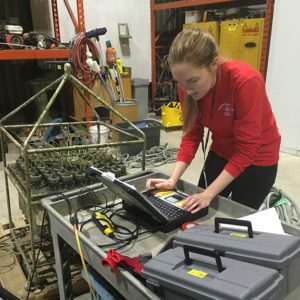
Applicants who do not receive an offer on February 1st should not be discouraged. There is still plenty of time to apply to College or complete academic upgrading to be considered for admission. Most programs will remain open leading into the start of classes in September until there are no longer any seats available. Applications will now be reviewed on a first-come, first-served basis and offers of admission will be made once the College admissions officers have all of the information they need to assess the application. This primarily requires the submission of educational transcripts.
Some programs attract many applications and these are the programs that require applicants to apply as early as possible. Programs that attract a lot of applications at the Pembroke Campus include Nursing, Forestry Technician and Carpentry and Renovations Techniques, so applying soon is advised to avoid the risk of being placed on a waitlist.
Today is a day to celebrate for the applicants who applied early and received an offer of admission. Congratulations to every one of you and we look forward to having you study with us at the Waterfront Campus.
Posted by Jamie Bramburger, Manager of Community and Student Affairs
Posted on Monday, January 25th, 2021
Nominations are now open for the 2021 Cross College Awards for graduating students and recent graduates. (Nominees must have graduated in Spring 2020 or Fall 2020, or be graduating in Winter 2021.) The application deadline is April 30, 2021 at 4:00 p.m. A student or grad may apply for a College Award(s), or may be nominated by a fellow student, by a member of the faculty, or by others in the College community.
There are four Cross College Awards:
Please visit algonquincollege.com/financial-aid/awards-and-scholarships/college-wide-awards/cross-college-awards for the full criteria for each award and to apply – last day to submit is April 30, 2021 at 4:00 p.m.